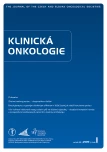Development of Resistant GvHD in a Patient Treated with Nivolumab for Hodgkin‘s Lymphoma Relapse after Allogeneic Unrelated Transplantation
Authors:
K. Steinerová; P. Jindra; D. Lysák; M. Karas
Authors‘ workplace:
Hematologicko-onkologické oddělení, FN Plzeň
Published in:
Klin Onkol 2019; 32(1): 66-69
doi:
https://doi.org/10.14735/amko2019
Overview
Background:
Allogeneic hematopoietic stem cell transplantation is one of the therapeutic options for patients with relapsed or refractory classic Hodgkin’s lymphoma (cHL). In the case of disease relapse after transplant, other treatment options are still limited (for example donor lymphocyte infusion, and chemotherapy with brentuximab, bendamustine, or other agents) with uncertain outcomes in terms of patient tolerance and long-term disease remission. One way to achieve remission is administration of the PD-1 inhibitor nivolumab, a PD-1 checkpoint inhibitor. Nivolumab is also indicated for the treatment of cHL relapses after autologous hematopoietic stem cell transplantation. Since September 2018, nivolumab has been approved by the State Institute for Drug Control in the Czech Republic for treatment of cHL autologous hematopoietic stem cell transplantation relapse; however, treatment with nivolumab is accompanied by an increased risk of developing fatal, acute graft-versus-host disease.
Case:
The article describes the development of resistant acute graft-versus-host disease in a patient who had received allogeneic-unrelated transplantation and nivolumab treatment for Hodgkin’s lymphoma relapse.
Conclusion:
Our case study, as well as the literature review, demonstrates the excellent efficacy of PD-1 inhibitors, but also cautions against the administration of these agents in patients following allogeneic hematopoietic stem cell transplantation. Administration of nivolumab to these patients should be done on a strictly individual basis in the context of known risks, and consideration should be given to other treatment options.
Key words
Hodgkin‘s lymphoma – PD-1 inhibitor – nivolumab – GvHD – transplantation
Sources
1. Burroughs LM, O’Donnell PV, Sandmaier BM et al. Comparison of outcomes of HLA-matched related, unrelated, or HLA-haploidentical related hematopoietic cell transplantation following nonmyeloablative conditioning for relapsed or refractory Hodgkin lymphoma. Biol Blood Marrow Transplant 2008; 14(11): 1279– 1287. doi: 10.1016/ j.bbmt.2008.08.014.
2. Raiola A, Dominietto A, Varaldo R et al. Unmanipulated haploidentical BMT following non-myeloablative conditioning and post-transplantation CY for advanced Hodgkin’s lymphoma. Bone Marrow Transplant 2014; 49(2): 190– 194. doi: 10.1038/ bmt.2013.166.
3. Rashidi A, Ebadi M, Cashen AF. Allogeneic hematopoietic stem cell transplantation in Hodgkin lymphoma: a systematic review and meta-analysis. Bone Marrow Transplant 2016; 51(4): 521– 528. doi: 10.1038/ bmt.2015.332.
4. Ansell SM, Lesokhin AM, Borrello I et al. PD-1 blockade with nivolumab in relapsed or refractory Hodgkin‘s lymphoma. N Engl J Med 2015; 372(4): 311– 319. doi: 10.1056/ NEJMoa1411087.
5. Sukl.cz. Státní ústav pro kontrolu léčiv. [online]. Dostupné z: http:/ / www.sukl.cz/ .
6. Oshima Y, Tanimoto T, Yuji K et al. Association between GvHD and nivolumab in the FDA adverse event reporting system. Bone Marrow Transplant 2017; 52(10): 1463– 1464. doi: 10.1038/ bmt.2017.158.
7. Herbaux C, Gauthier J, Brice P et al. Efficacy and tolerability of nivolumab after allogeneic transplantation for relapsed Hodgkin lymphoma. Blood 2017; 129(18): 2471– 2478. doi: 10.1182/ blood-2016-11-749556.
8. Blazar BR, Carreno BM, Panoskaltsis-Mortari A et al. Blockade of programmed death-1 engagement accelerates graft-versus-host disease lethality by an IFN-γ-dependent mechanism. J Immunol 2003; 171(3): 1272– 1277.
9. Deng R, Cassady K, Li X et al. B7H1/CD80 interaction augments PD-1–dependent T cell apoptosis and ameliorates graft-versus-host disease. J Immunol 2015; 194(2): 560–574. doi: 10.4049/jimmunol.1402157.
Labels
Paediatric clinical oncology Surgery Clinical oncologyArticle was published in
Clinical Oncology

2019 Issue 1
- Possibilities of Using Metamizole in the Treatment of Acute Primary Headaches
- Metamizole vs. Tramadol in Postoperative Analgesia
- Metamizole at a Glance and in Practice – Effective Non-Opioid Analgesic for All Ages
- Spasmolytic Effect of Metamizole
- Metamizole in perioperative treatment in children under 14 years – results of a questionnaire survey from practice
-
All articles in this issue
- Stereotactic Body Radiotherapy – Current Indications
- Is There a Benefit of HER2-Positive Breast Cancer Subtype Determination in Clinical Practice?
- Malignant Tumors of the Penis – Diagnostics and Therapy
- Plasma Cell Leukemia – the Forgotten Disease
- High-Dose Rate Brachytherapy in the Treatment of Early Stages of Penile Carcinoma
- Effect of Tumor Size and p16 Status on Treatment Outcomes – Achievement of Complete Remission in Prospectively Followed Patients with Oropharyngeal Tumors
- Development of Resistant GvHD in a Patient Treated with Nivolumab for Hodgkin‘s Lymphoma Relapse after Allogeneic Unrelated Transplantation
- Effective Immunotherapy of Glioblastoma in an Adolescent with Constitutional Mismatch Repair-Deficiency Syndrome
- Epidemiology of Plasma Cell Leukemia in the Czech Republic
- Clinical Oncology
- Journal archive
- Current issue
- About the journal
Most read in this issue
- Malignant Tumors of the Penis – Diagnostics and Therapy
- Stereotactic Body Radiotherapy – Current Indications
- Effect of Tumor Size and p16 Status on Treatment Outcomes – Achievement of Complete Remission in Prospectively Followed Patients with Oropharyngeal Tumors
- Is There a Benefit of HER2-Positive Breast Cancer Subtype Determination in Clinical Practice?
